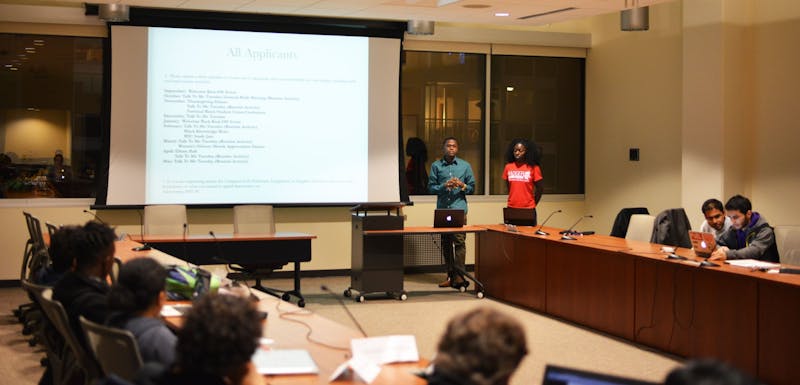

UW-Madison students and city residents gathered at the state Capitol on Nov. 1 for a march hosted by the Wisconsin Black Student Union (WBSU) to promote unity and provide a safe space for conversations between Black students and allies.
Vehicles positioned themselves across intersections surrounding the Capitol to form a blockade. This blockade would allow for a safe and open space to engage in WBSU’s “United We Heal: A Moment of Revival for Black Fatigue” demonstration.
The peaceful protest originally intended to be a convoy of vehicles with demonstrators walking alongside the street from the Capitol to East Campus Mall. While demonstrators brought pens and paper for sign-making and a megaphone was made available for fellow protestors, the event was ultimately moved online to Instagram Live in an attempt to avoid provoking supporters of incumbent Pres. Donald Trump.
Still, the shift to an online demonstration did not change attendance by UW-Madison students and city residents. Protestors associated with a variety of other groups joined at the Capitol to show their support as well.
WBSU paired with organizations such as the Wisconsin Association of Black Men, Campus Women’s Center, Student Inclusion Coalition, National Pan-Hellenic Council, Black Umbrella, African Student Association and the National Society for Black Engineers. Over 100 people attended the Instagram live event.
Performances on Instagram live included musical acts from Vilij (up and coming 19-year-old Noah Anderson) and Papa Holt (released his first EP on Oct. 26 with music on all streaming platforms), with spoken word acts from Matthew Charles, Isha Camara and Robin Robinson.
Generally speaking, the Instagram live audience thoroughly enjoyed the various performances.
“People were encouraging and amping them up while performing. Everyone was talking about their experiences as a Black person which can shape your identity a lot,” said WBSU Outreach Coordinator Camika Hurdle, who also MC’d the event. “It was interesting to hear what people went through and seeing people in the comment section understanding and relating to their experiences.”
Other protestors at the Capitol set up flowers, candles, decorated skulls, incense, Spanish children’s books, photos of children and fruits such as pineapples and bananas. These are traditional Mexican remembrance pieces that were used to honor the children who have been taken and the families torn apart at the hands of ICE.
Demonstrators used a box to represent cages that held the children of immigrants and asylum seekers — a direct reference to immigration policy that separates children from their families at the U.S. southern border. Messages against the U.S. Immigration and Customs Enforcement and its policies were written all over the “cage.”
At the Capitol, in-person attendees separated themselves into small circles to engage in discussions about immigration, police brutality and the previously-impending presidential election. Some demonstrators gathered around a table with freshly made tamales, donuts and warm beverages as they talked. Incoming members and allies of the Black community were embraced with hugs and smiles upon their arrival.
These emotions, associated with a warm sense of community, conflicted with participants’ feelings about a pro-Trump convoy scheduled for the same time in the same location around Capitol Square.
At approximately 1:30 p.m., honking vehicles echoed throughout the streets as a caravan of trucks sporting “Trump 2020” and “Make America Great Again” slogans passed by.
Other prominent messages spotted on the vehicles included pro-police slogans such as “Blue Lives Matter” and “We Back The Badge.” However, the protesters’ blockade forced the Trump-supporting convoy to deviate from its original course, pushing them to re-route and make a circle through the city.
“It really shows a lot that there are not that many people here with us compared to the Trump convoy,” said a protestor speaking on the condition of anonymity. “You can really see how racist Wisconsin can be and it irritates me that not many people are here to support one another.”
Later, a quarrel broke out between the two parties as Trump supporters parked their cars — including old military jeeps and armored personnel carriers — poured onto nearby streets.
Protestors retaliated against the pro-Trump demonstrators with chants and tropes such as “F*** 12” and “F*** Trump” that condemned the police and incumbent U.S. president. Demonstrators and passersby directed middle fingers at the convoy as well.
Medics — equipped with medical equipment and gas masks — offered their services and positioned themselves to assist individuals in case potential violence ensued. One individual who allegedly attended the rally reportedly carried a holstered pistol.
After the convoy passed, activities began to return to normal. Flyers and additional informational pamphlets were passed out to those walking past the Capitol. Discussions still occurred between protesters, but there was an obvious change of tone after the overshadowing convoy. Protesters were more on edge and conversations shifted to racial injustices and scrutiny against President Trump.
“Hopefully when we are not virtual we can keep the momentum moving. A lot of people are working on creating spaces for the black community,” Hurdle said. “Being able to be in a space where you can talk to people with similar experiences is very important. Also, knowing that there are other black students near you. If you do not seek out the community it can be unfortunately hard to find it.”